As we look back at 1984, please welcome new contributor John Guerin to talk about a famous Oscar triple...
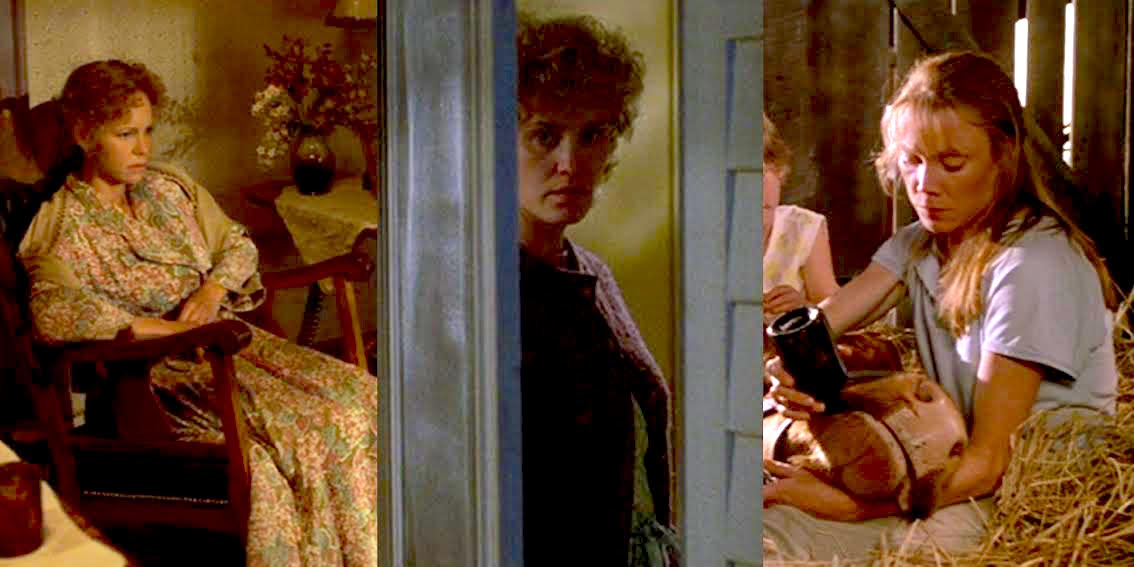 In 1984, 60% of the Best Actress category was farm wives
In 1984, 60% of the Best Actress category was farm wives
In May 1985, after scoring Oscar nominations for playing distressed farmwives in Country and The River, Jessica Lange and Sissy Spacek testified before the U.S. House of Representatives and urged senators to help aid farmers during a devastating agricultural crisis. After a toxic combination of faulty economic policies, mounting debts, high interest rates, and a declining Midwest population, American farmers were experiencing financial hardship unseen since the Great Depression. Both Country and The River offer visions of farm families under such pressures, pitting family and community against unyielding forces of nature and government.
Can you remember the last time an actress testified before Congress after starring in a politically-minded film?
Granted, today’s film industry is barely recognizable from that of 1984, and the Internet now offers countless ways to be an advocate without stepping onto capitol hill; still, this plucky move rarely happens. Republican senators chided Lange, Spacek, and Jane Fonda – she too played an impoverished farmwife, in the 1984 TV movie The Dollmaker – for confusing their Hollywood entertainment with reality. Yes, these actresses are not farmwives. They are famous, successful, and rich; they are stars. They don’t stand with the working class, but they can speak for them. They secure backing for unglamorous films and lend their stardom to noble causes. This blend of political positioning, de-glam techniques, and feminist authority yields performances worth considering.
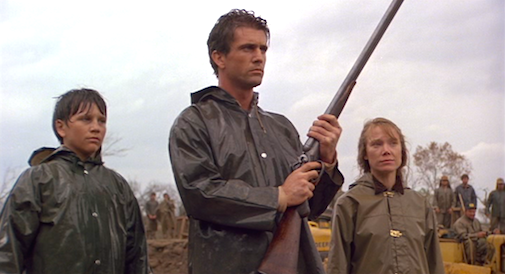
In The River, Mel Gibson and Sissy Spacek are Tom and Mae Garvey, tireless Tennessee farmers whose land keeps flooding by the bordering river. Crop prices are dropping, loans have piled up, and the water keeps running. Tough and resolute, Tom refuses to be bought out by Joe Wade (Scott Glenn), a local mill boss who wants to build an electric dam in the valley. Spacek is not really performing here but working; she milks cows, bakes pies, plows fields, and labors tirelessly in her scenes. Farmwives spend a lot of time washing dishes and driving tractors, and Spacek makes this work visible, especially when Joe goes to work in an iron mill, leaving her responsible for managing the farm. A terrifying episode where Mae’s arm is caught underneath her tractor becomes a showcase for Spacek’s taciturn, resourceful talent. When she isn't working, Mae tries urging Joe to abandon his timeworn ideals. The film works hard to champion the farm, a saccharine John Williams score does some heavy lifting, and Spacek's smart pleads are too often framed as a soft or weak counter to Gibson’s stubborn resolve. An asset to any film, Spacek gives a small, sturdy performance, capably hitting marks we knew she already could. She lends her wise, graceful presence to an easily forgotten Supporting Wife role, but it’s not enough to warrant a nomination.
The film lionizes hardworking farm families like the Garveys, but strikes more anxious chords than I had anticipated. Your farm is everything, home and work, yet it is governed by natural and economic forces largely outside your control. Foreclosure becomes the ultimate failure. Your life is sold off to neighbors who can't afford much anyway, each auction a specter into your possible ruin, each one closer to your own. Like most Reaganistic 80s Americana, The River soon becomes a tale of a little – but strong – guy battling a cold, bureaucratic government. Never mind that Wade’s electric dam is pragmatic planning, or that the river will probably soon flood again, one’s resilient heritage and rugged individualism are more valuable than smart problem-solving. Against all odds, the Garveys hold back the river and hold onto their land, but this fantastical end undercuts the film’s more somber suggestions.
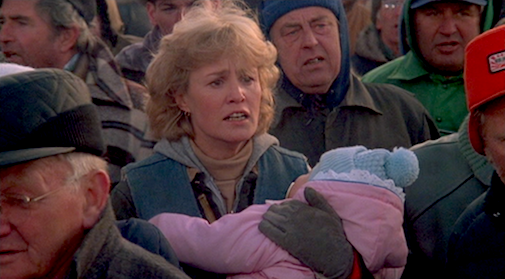
Jessica Lange was originally cast in The River, but instead pursued her own vehicle, a farmwife role not resigned to the background. Country, like The River, is a film about a farm couple facing foreclosure. Jessica Lange and Sam Shepard are Jewell and Tom Ivy, grandchildren of farmers now saddled with skyrocketing loans and impending poverty. While The River sheepishly indicts the weather and “big-government”, Country looks squarely at the shady bank practices that caused this disaster and offers a more distressing conclusion. Lange – I’ll proudly name her a personal God – gives a relaxed, spirited performance, refusing to yield to unfair policies while testing the limits of her own valor. Seemingly animated by the film’s initial lightning bolts, Jessica Lange summons anger like few other actresses, channeled here into articulate fits of rage and measured moments of frustration. But Jewell is not a destructive, unhinged volcano, and rather than become a lone warrior, she realizes the value in working together. “No sale!” she shouts during her farm’s auction, animated by the crowd and then soon shouting above them. In Lange’s quivering hands, Jewell is neither an extraordinary activist nor a background farmwife. Like her film, she is smart, enraged and attuned to her own melancholy. The film’s last half-hour is a doleful close and poignant reminder that poverty and political neglect are not easily resolved.
And then there’s Edna Spalding.
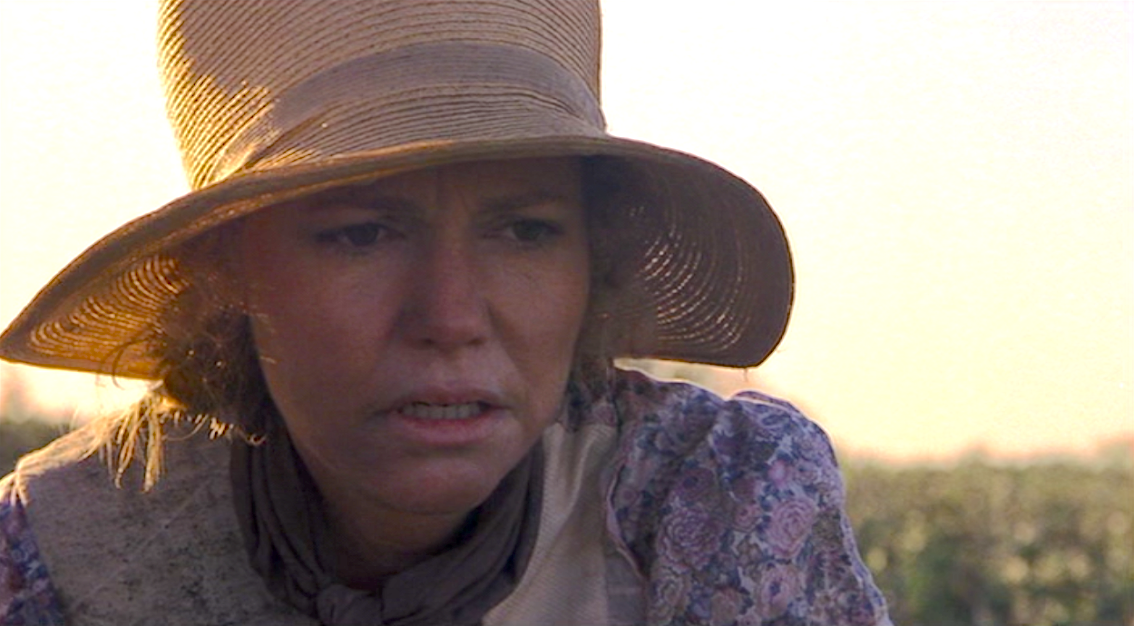
If Country and The River are about communities banding together against a common enemy, Places in the Heart is instead a tale of a community coming together for one woman’s improbable comeback. Inspired by his own childhood in Texas during the Great Depression, Robert Benton makes Places in the Heart a more personal endeavor than the other farm films. Sally Field is Edna Spalding, a broke widow who must raise enough cash to keep her home. With the help of Moses (Danny Glover), her Magical Negro, Mr. Will (John Malkovich), a blind veteran, and a group of African-American workers, Edna grows forty acres of cotton and saves her farm.
If you’re maybe looking for a nuanced survey of three unprivileged people forming a bond against great stigma, look elsewhere. We don’t spend any alone time with Moses or Mr. Will, or share any glimpse into the relationships between these characters. It’s all about Edna, rendered by Sally Field as a woman confused by everything. Edna Spalding is somehow both naïve enough that she can’t write a check and savvy enough to grow forty acres of cotton. The script is pockmarked with gaps in each character’s backstory, and Field more than anybody surrenders to a broad mime. Her harried expression remains locked into her signature clenched, flustered stare. She furrows her brow, rolls up her dirty apron, and turns suffering into an Olympic sport. She’s kind but almost out of stupidity. She respects Moses but calculates his advantages. She’s not as prejudiced as the Klan, but probably because she isn’t thinking of anyone but herself. It’s the kind of histrionic, dress-up acting that believes overcompensating for one emotion allows you to forget any of the rest. Field never summons the tough grit and tenacious will of her character, and instead creates an embarrassing, waifish shtick, inexplicably laureled in its time.
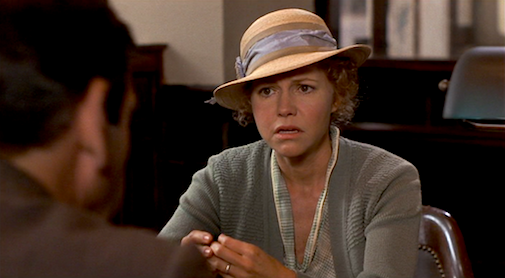
Varying quality aside, Field, Lange, and Spacek all hold it down. Although this isn’t a box-set I’ll reach for, the Farmwives trio champion women persevering over disparate circumstances, and feature actresses sticking their necks out for causes that matter. Edna, Mae, and Jewell are the valiant working-class women movies constantly evade, and the heroes our contemporary films lack.